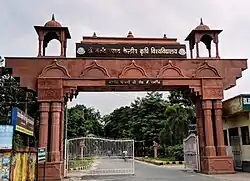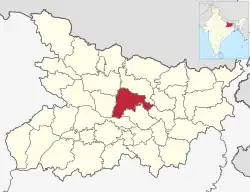Samastipur district
Samastipur is one of the thirty-eight districts of Bihar in India. The district headquarters are located at Samastipur. The district occupies an area of 2904 km² and has a population of 4,261,566.[1]
Samastipur district | |
|---|---|
 Dr. Rajendra Prasad Central Agriculture University | |
 Location of Samastipur district in Bihar | |
| Country | |
| State | |
| Region | Mithila |
| Division | Darbhanga |
| Headquarters | Samastipur |
| Subdivisions | Samastipur, Dalsinghsarai, Rosera, Patori |
| Government | |
| • Lok Sabha Constituencies | Samastipur, Ujiarpur |
| • Vidhan Sabha Constituencies | Kalyanpur, Warisnagar, Samastipur, Ujiarpur, Morwa, Sarairanjan, Mohiuddinnagar, Bibhutipur, Rosera, Hasanpur |
| Area | |
| • Total | 2,904 km2 (1,121 sq mi) |
| Population (2011)[1] | |
| • Total | 4,261,566 |
| • Density | 1,500/km2 (3,800/sq mi) |
| Demographics (2011)[1] | |
| • Literacy | 61.86% |
| • Sex ratio | 911 ♀/1000 ♂ |
| Time zone | UTC+05:30 (IST) |
| PIN | 848101 (Samastipur)[3] |
| Major highways | NH-122, NH-322 |
| Website | samastipur |
Samastipur is the largest milk producing district of Bihar in 2022.[4]
History
Samastipur became a district in 1972 when it was split from Darbhanga district.[5]
Samastipur consists of four sub-divisions :-
- Rosera
- Samastipur
- Dalsinghsarai
- Shahpur Patori
Historically, the Samastipur district has been dominated by Koeri, Yadav and Dusadh castes. There is also a sizeable presence of Bhumihars in some of the regions, but they wield less political influence, as they are not united politically. For this reason, most of the total ten assembly constituencies falling in this district has been dominated by Koeris. The two Lok Sabha constituencies, which are part of this district are also dominated by Koeris and Dusadhs. It has been recorded that in this district, the Koeri caste is indulged in criminality, as they are politically strong. [6]
Geography
Samastipur district occupies an area of 2,904 square kilometres (1,121 sq mi),[2] comparatively equivalent to Indonesia's Muna Island.[7] Samastipur is bounded on the north by the Bagmati River which forms part of the border with Darbhanga district. On the west it is bordered by Vaishali and Muzaffarpur districts, on the south by the Ganga, which forms the border with Patna district, while on its southeast are Begusarai and Khagaria districts. The district headquarters is located at Samastipur. The district is largely agricultural farmland with very little forest cover.
Politics
Ujiarpur Lok Sabha constituency and Samastipur Lok Sabha constituency are the Parliament constituencies.
| District | No. | Constituency | Name | Party | Alliance | Remarks | ||
|---|---|---|---|---|---|---|---|---|
| Samastipur | 131 | Kalyanpur | Maheshwar Hazari | JD(U) | MGB | |||
| 132 | Warisnagar | Ashok Kumar | JD(U) | MGB | ||||
| 133 | Samastipur | Akhtarul Islam Sahin | RJD | MGB | ||||
| 134 | Ujiarpur | Alok Kumar Mehta | RJD | MGB | ||||
| 135 | Morwa | Ranvijay Sahu | RJD | MGB | ||||
| 136 | Sarairanjan | Vijay Kumar Chaudhary | JD(U) | MGB | ||||
| 137 | Mohiuddinnagar | Rajesh Kumar Singh | BJP | NDA | ||||
| 138 | Bibhutipur | Ajay Kumar | CPI(M) | MGB | ||||
| 139 | Rosera | Birendra Kumar | BJP | NDA | ||||
| 140 | Hasanpur | Tej Pratap Yadav | RJD | MGB | ||||
Economy
In 2006 the Ministry of Panchayati Raj named Samastipur one of the country's 250 most backward districts (out of a total of 640).[8] It is one of the 36 districts in Bihar receiving funds from the Backward Regions Grant Fund Programme (BRGF).[8]
Demographics
According to the 2011 census Samastipur district has a population of 4,261,566,[1] roughly equal to the Republic of the Congo[10] or the US state of Kentucky.[11] This gives it a ranking of 45th in India (out of a total of 640).[1] The district has a population density of 1,467 inhabitants per square kilometre (3,800/sq mi).[1] Its population growth rate over the decade 2001-2011 was 25.53%.[1] Samastipur has a sex ratio of 911 females for every 1000 males,[1] and a literacy rate of 61.86%. 3.47% of the population lives in urban areas. Scheduled Castes and Scheduled Tribes make up 18.85% and 0.04% of the population respectively.[1]
At the time of the 2011 Census of India, 52.32% of the population in the district spoke Hindi, 30.79% Maithili and 8.40% Urdu as their first language. 8.29% of the population recorded their language as 'Others' under Maithili.[12]
Notable people
- Ram Balak Singh Kushwaha, two term Member of Bihar Legislative Assembly.
References
- "District Census Handbook: Samastipur" (PDF). Census of India. Registrar General and Census Commissioner of India. 2011.
- Srivastava, Dayawanti (2010). "States and Union Territories: Bihar: Government". India 2010: A Reference Annual (54th ed.). New Delhi, India: Additional Director General, Publications Division, Ministry of Information and Broadcasting (India), Government of India. pp. 1118–1119. ISBN 978-81-230-1617-7.
- Samastipur
- "Bihar Economic Survey 2022-23". state.bihar.gov.in. Retrieved 7 May 2023.
- Law, Gwillim (25 September 2011). "Districts of India". Statoids. Retrieved 11 October 2011.
- Thakur, Minni (2010). Women Empowerment Through Panchayati Raj Institutions. Concept Publishing Company. p. 31. ISBN 978-8180696800. Retrieved 16 June 2020.
- "Island Directory Tables: Islands by Land Area". United Nations Environment Program. 18 February 1998. Archived from the original on 20 February 2018. Retrieved 11 October 2011.
Muna 2,889km2
- Ministry of Panchayati Raj (8 September 2009). "A Note on the Backward Regions Grant Fund Programme" (PDF). National Institute of Rural Development. Archived from the original (PDF) on 5 April 2012. Retrieved 27 September 2011.
- "Table C-01 Population by Religion: Bihar". censusindia.gov.in. Registrar General and Census Commissioner of India. 2011.
- US Directorate of Intelligence. "Country Comparison:Population". Archived from the original on 13 June 2007. Retrieved 1 October 2011.
Congo, Republic of the 4,243,929
- "2010 Resident Population Data". U. S. Census Bureau. Retrieved 30 September 2011.
Kentucky 4,339,367
- "Table C-16 Population by Mother Tongue: Bihar". censusindia.gov.in. Registrar General and Census Commissioner of India. 2011.